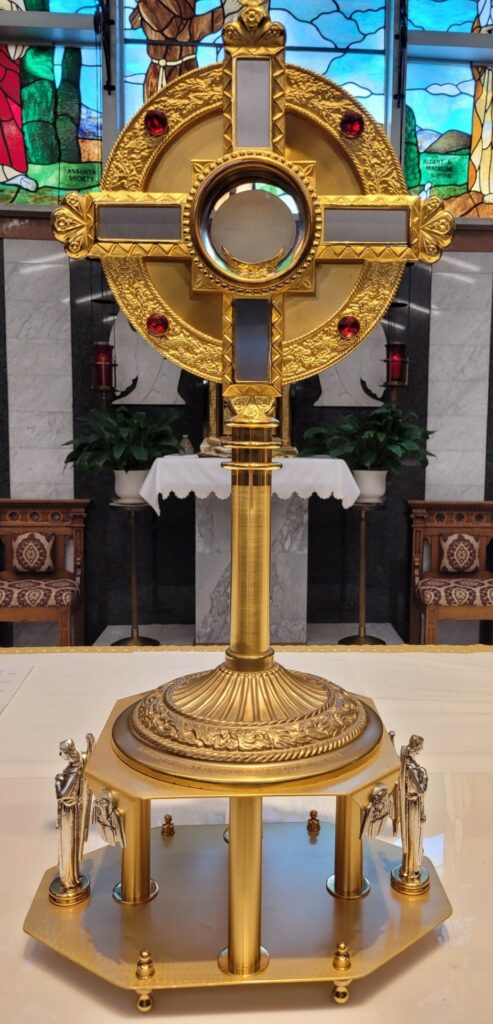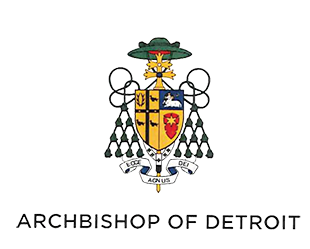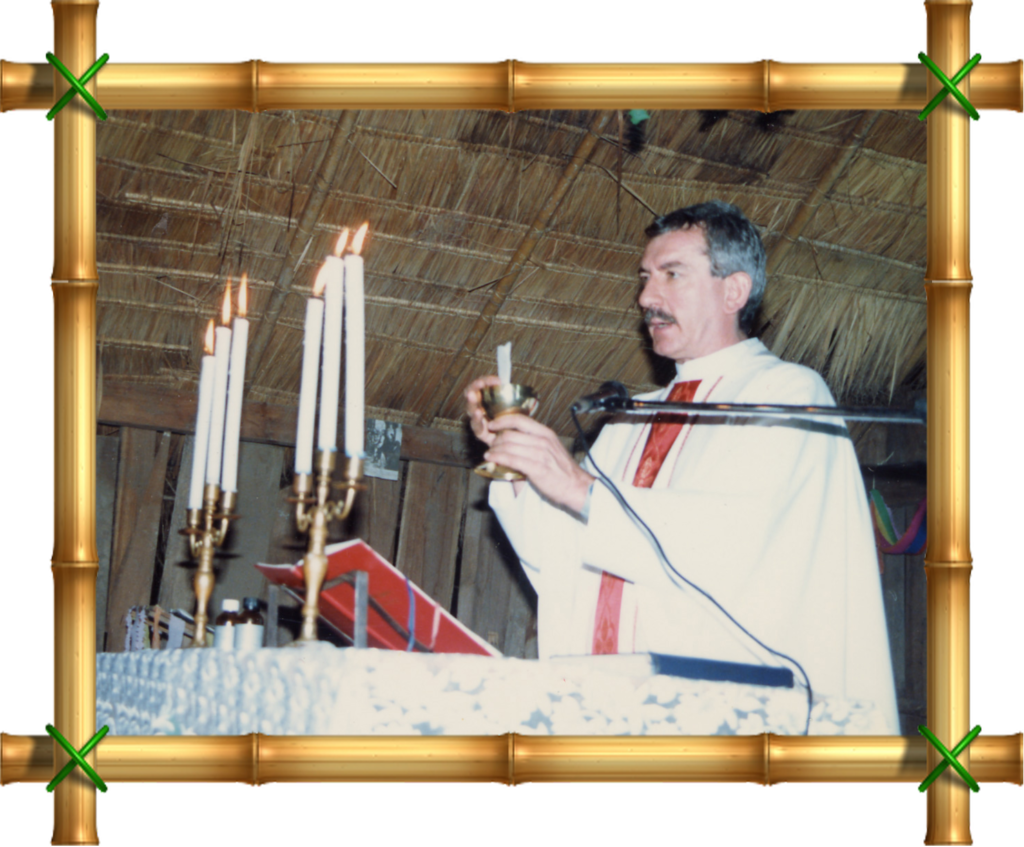San Francesco Parish, in Clinton Township, Michigan is a personal parish established to serve the Italian community and all people who choose to use its services in lieu of their territorial parish. San Francesco Parish has no geographic boundaries, and all are welcome to come together to worship and grow in faith and love.
MASS TIMES
DAILY: 8am
SATURDAY: 8am and 6pm
SUNDAY: 8am, 10am (Italian), 12pm
Adoration of the Blessed Sacrament every Friday from 8:30 AM to 12:00 noon with Benediction at 11:50 AM.
First Friday devotions to the Sacred Heart of Jesus and Benediction with the Blessed Sacrament.
First Saturday devotions to the Immaculate Heart of Mary and Benediction with the Blessed Sacrament.
THE SACRAMENT OF RECONCILIATION
Offered every Friday of Lent from 6:00-6:50 p.m. and whenever Fr. Dino or Fr. Marco are available.
STATIONS OF THE CROSS Every Friday in Lent at 7:00 p.m.
BAPTISMS
SUNDAY: 1pm BY APPOINTMENT
MARRIAGES
CALL RECTORY OFFICE AT LEAST 6 MONTHS BEFOREHAND
Link to Detroit Priestly Vocations Website
Make ALL choices, choices for LIFE: rtl.org/find-help/
Ash Wednesday and Good Friday
The norms of fasting are obligatory from age 18 until age 59. When fasting, a person is permitted to eat one full meal, as well as two smaller meals that together are not equal to a full meal. Ash Wednesday and all Fridays of Lent are days of abstinence from meat. The norms concerning abstinence from meat are binding on everyone from age 14 onwards.
From Archbishop Edward J. Weisenburger
Dear Brothers and Sisters in Christ,
Since arriving in Detroit this past March, I have had the great joy of meeting many of you at parish celebrations, diocesan gatherings, Mass, and other liturgies. In every encounter, I have seen something truly beautiful. I have witnessed your deep love for Christ, your local parish, and our Archdiocese. I also have witnessed your intense desire to see the Church of Detroit flourish for generations to come.
Along with our many blessings, I have also heard the candid expression of your concerns and your understanding of the challenges we face now and into the future. Please know that I hear you and that I see these challenges, too. Many of our churches were built during a time of tremendous growth, when more than 1.5 million Catholics called this Archdiocese home. Today, our Catholic census is closer to 900,000, with a smaller number regularly attending Mass. We have been struggling to maintain buildings, ministries, and structures that were designed for a much larger Church. The situation that unfolded in the last 50 years has left us stretched – sometimes stretched too thinly to serve as well as we want. Moreover, as we struggle to care for buildings and parish structures where there are very few people, we are also seeking to ensure the presence of the Church as we follow the Catholic population in those areas where the Church is growing.
While I believe that our commitment to Christ and his Church means that we must face these challenges, I do not believe that this moment in time need be marked primarily by anxiety or despair. Rather, I believe the situation we are facing is one that holds real and blessed opportunities. I believe with all my heart that God is inviting us to reimagine parish life, priestly ministry, and our mission. I believe God is asking us to face our future with creativity and deeper faith and trust that if we ask Him, then He will show us the way toward building something vibrant, sustainable, and enduring into the future.
This is why I am inviting every Catholic in our Archdiocese to join me in a serious two-year process of Archdiocesan restructuring. It will be a journey of discernment that I believe we can accomplish only together—a time for us to chart the best path forward for each of our parish communities and regions. In such an endeavor, every voice matters, just as every prayer matters.
The end result will affect each parish and community of our Archdiocese, so each of you has a part to play in shaping the future of our Church.
-Archbishop Edward J. Weisenburger
———————————————————————————————
Brothers and Sisters in Christ,
You will recall that in 2021, Pope Francis issued guidelines for the celebration of the Mass in the extraordinary form, commonly called the “Traditional Latin Mass.” This is the expression of the Mass which was offered prior to Vatican II. Over the past four years, Archbishop Vigneron issued norms for the Archdiocese of Detroit in this regard. He communicated to the priests that while an extension of permission for parish churches was allowed temporarily, plans should be developed for these communities to come into union with the new liturgical teachings and law of the Church. As there are a number of the faithful in our local Church who have found spiritual richness in this form of the Mass, I am permitting it to continue in accord with the Holy See’s parameters. Toward that end there are two goods which must come together as we move forward: the pastoral care of these faithful as well as fidelity to the Holy Father’s call for the Ordinary form of the Mass to become the “unique expression of the lex orandi of the Roman Rite” (Traditionis Custodes, Art. 1). Guided by these principles, beginning July 1, 2025, the Traditional Latin Mass will be offered at St. Joseph Shrine in Detroit in the Central Region and three non-parish churches in each additional region of the Archdiocese of Detroit. These sites are as follows:
Central Region – St. Joseph Shrine in Detroit
South Region – St. Irene Church in Dundee
Northwest Region – Our Lady of Orchard Lake Chapel in Orchard Lake
Northeast Region – St. Joseph Church in Port Huron
Permission for this celebration at all other sites will expire on June 30, 2025. While not every priest will retain the required permission to celebrate the Mass according to the rubrics of the 1962 missal, a number of priests will be available to serve these four regional sites. I take seriously my charge to care for all the faithful and am confident that this new arrangement is faithful to the Church’s law while expressing my concern for your spiritual welfare. I have been impressed by the rich expressions of the Catholic faith in Southeast Michigan. The unity of our Catholic faith need not be diminished by diversity. Likewise, fidelity to Christ is only possible if we remain faithful to the Church, under the leadership of our Pope and the local bishop. I am grateful for your cooperation in implementing this new direction which aligns us with the instruction from the Holy See, and equally grateful for your prayers for me and for all our priests. -Archbishop Edward J. Weisenburger
———————————————————————————————
Make all choices, choices for LIFE
https://rtl.org/find-help/
From Fr. Dino Vanin, PIME
Some ways of “hanging out” with Jesus in the Blessed Sacrament
Spend as much or as little time as you wish on any of the following spiritual suggestions or come up with your own)
- Do a brief “Lection Divina” (read, reflect, respond and rest) on the readings of the day.
- Invite Jesus to tell you how he “reads” your body language right now.
- Invite Jesus to explain to you why you feel the way you have mostly been feeling lately.
- Chat with Jesus about your chronic fears and worries. Listen to His comments about them.
- Recite unhurriedly the 1st decade of the Rosary. (Sunday & Wednesday: Glorious; Monday & Saturday: Joyful; Tuesday & Friday: Sorrowful; Thursday: Luminous).
- Ask Jesus to point out to you your “blind spots” in reading the Gospel and in daily events of all sizes.
- Allow Jesus to convince you that it is wise and spiritually healthy to live with a sense of inadequacy.
- Beg Jesus to fill your spiritual poverty with any richness He wishes to grant you.
- Let Jesus see how much certain situations in your family trouble you.
- Recite unhurriedly the 2nd decade of the Rosary.
- Open the hymnal in the pew rack and sing silently a couple of stanzas of a favorite song of yours.
- Go over with Jesus every member of your family and ask Him what He expects of you for them.
- Go over with Jesus your co-workers and/or associates who present challenges to you.
- Let Jesus tell you why He decided to be so accessible to you in a small wafer.
- Recite unhurriedly the 3rd decade of the Rosary.
- Recite the “Our Father” pausing for some time on the words: Thy will be done.
- Tell Jesus the reasons why you are not as generous as you should be with your talents.
- Ask Jesus to make you truly concerned about your brothers and sisters in distant mission lands.
- Get enough courage to ask Jesus to point out how you must unclutter your heart to make room for Him.
- Recite unhurriedly the 4th decade of the Rosary.
- List to Jesus the gifts He has given you and for which you are truly grateful.
- Confess to Jesus all your feelings of jealousy and listen to Him as He adds to the list of His gifts to you.
- Show Jesus how truly sorry you are for your sins. But, also, how much you trust in His mercy.
- Ask Jesus to help you focus on bearing the fruits of the Spirit rather than dwelling on your past sins.
- Recite unhurriedly the 5th decade of the Rosary.
- Apologize for the merely short-lived acts of abandonment into the Father’s hands; then surrender wholeheartedly to Him as Jesus did throughout His life on earth.
Fr. Dino Vanin, PIME
About Indulgences in Plain English
The starting point for a correct understanding of what indulgences are and how they are applied for the spiritual benefit of the faithful must be the beautiful reality of the Mystical Body of Christ in which we live through Baptism.
Saul, the future St. Paul, was on his way to Damascus with murderous thoughts to do away with the fledging Church of God in that city. This is what happened before he got there: He fell to the ground and heard a voice saying to him, “Saul, Saul, why are you persecuting me?” Acts 9:4. From that shocking experience, St. Paul understood that by persecuting members of the early Church, he had been persecuting the Lord Jesus Christ himself as Head of the Mystical Body. Thanks to that experience, in St. Paul’s letters we find the best doctrine on the Church as the Mystical Body of Christ. Especially in 1 Corinthians 12: 12-24, St. Paul draws many parallels between the human body and the Mystical Body of Christ and then he adds: so that there may be no division in the body, but that the parts may have the same concern for one another. If one part suffers, all the parts suffer with it; if one part is honored, all the parts share its joy. Now you are Christ’s Body, and individually parts of it. 1 Corinthians 12:25-27.
Let us first reflect on what causes the Body of Christ to suffer: it is sin, any sin however small brings pain to the whole Body. Sin is an offense against God for breaking one of His laws. Although God cannot be hurt by anything, sin included, the Church, (Mystical Body of Christ) is hurt, and suffers.
The ordinary way in which the faithful can be reconciled with God and with His Church for the suffering caused by sinning is by availing themselves of the Sacrament of Reconciliation (Confession). Penitents who are truly sorry for their sins and who resolve, with the help of grace, to avoid sinning in the future and who receive absolution, have their sins washed away by the Blood of Christ through the ministry of the Church. However, they need to do the “penance” assigned to them by the confessor. Penance consists of expressions of love such as prayers, charitable work, sacrifices, fasting, almsgiving, and so on, all designed to make up for the hurts caused to the “militant” part of the Mystical Body of Christ, the one living on this earth as distinct from the “triumphant” part (the Blessed Mother and all the Saints), and the “suffering” part, the one undergoing purification in the state of Purgatory.
Let us now reflect on what brings honor, solace, and joy to the Mystical Body of Christ. Docile and humble cooperation with the Holy Spirit enables the faithful to bear the fruits of genuine love: In contrast, the fruit of the Spirit is love, joy, peace, patience, kindness, generosity, faithfulness, Galatians 5:22. Since in Heaven there is no reason or need for faith and hope, the only reality which lasts for all eternity is love. God is love, those in Heaven are love (cf. 1 John 3:2). Love creates a permanent bond among the Saints, the faithful on this earth, and those being purified in the state called Purgatory. This bond is referred to as the Communion of Saints.
This bond of love is meant to be a source of tremendous comfort for us sinners. This is because, in virtue of the power of binding and loosing granted to her by the Lord (cf. Matthew 18:18 and John 20:23), the Church makes available to us and to those being purified the treasury of the infinite merits and prayers of Jesus Christ, those of the Blessed Mother and all the Saints, all the acts of love, the prayers and all the fruits of the Spirit, which those still on this earth are bearing.
Indulgences can be thought of as the applications of the riches of the Church’s treasury to lessen or nullify the temporal punishment resulting from sinning. Indulgences can be likened to a spiritual balm to soothe or eliminate the pain caused to the whole Body of Christ and to aid the faithful’s efforts to correspond to the Holy Spirit in their sanctification. The Church assigns certain conditions for the application of indulgences. The conditions are set by those to whom Christ has given the power to bind and to loose.
Indulgences can be partial, or plenary as defined by the Church. The partial ones are intended to remit a determined portion of the temporal punishment due to sins; the plenary ones remit the temporal punishment in its totality up to the time they are requested for those still on this earth.
Within the Communion of Saints, indulgences can be applied to the faithful pilgrims on this earth and/or to those undergoing purification after death. With every sin committed, the image of Christ, which was perfectly pure on the day of Baptism, undergoes woeful “punishment” and disfigurement. After death, this “punishment” inflicted by sins to the image of Christ in each of the faithful, needs to undergo a punishment of fire until all the dross and incrustations built on that image are “burned away”, and they become pure love just as God is the pure perfection of love. Right away it should be said that we must think of this punishment of fire not as chastisement of a vengeful God but, rather, as an expression of His infinite love and mercy. For example, the finest swords, including the famed samurai swords, undergo an incredible amount of punishment in the forge of skillful smiths and the vigorous, incessant pounding of their hammers until perfection is reached.
The purification is done by a combination of three “fires:” First, the fire of God’s infinite love and mercy. Second, the fire of the excruciating pain and sudden, fierce embarrassment of the faithful being purified as, free from the distractions of earthly life, they realize their utter unworthiness and sinfulness in the blinding light of God’s absolute perfection. Lastly, the fire of the love of members of the militant Church expressed by their prayers, sacrifices, fasting, and acts of love including application to specific faithful departed plenary or partial indulgences and, most importantly, the offering of the Holy Sacrifice of the Cross to shorten the length of their purification.
Fr. Dino Vanin, PIME
The Missions Corner
A viable solution to immigration:
For decades, North America and Europe have grappled with the seemingly unsolvable problem of immigration. Territorial sovereignty of prosperous countries, protection of their borders, and care for the needs of their citizens must be balanced by the needs of poor migrants who flee starvation and other straits while they seek to make a decent living for themselves and their families. The United States and many European countries have poured billions of dollars into the coffers of impoverished countries while achieving few results because, due to widespread corruption, the funds wound up in the pockets of greedy and unscrupulous local rulers.
For Christians the issue is thornier yet, because we all know that, at the end of our earthly life, we will be judged on how we have attended to the needs of Jesus confronting us in his disguise as homeless, needy, and hungry.
In January, the Most Reverend Michele Tomasi, bishop of Treviso, Italy, paid a visit to Salesian missionaries and volunteers from the Veneto Region, including Treviso, working in Ecuador, and he could witness in several places a viable solution to the problem of immigration.
This solution could be summarized in this axiom: “Buy our products or welcome our migrants into your country.” Rather than inviting big corporations and multinational companies, which tend to be impersonal, to invest in Ecuador, local dioceses, with the help of missionaries and volunteers, embarked in an economic experiment that is producing encouraging outcomes. The secret of the project’s initial success is getting the local people, all with direct ties to the land, to be personally involved in creating and operating small, manageable businesses in which they all have a stake. Thus, they do not need any prodding to work hard for their success.
Ecuador is ideal for raising alpacas, llamas, and sheep. The wool of these three animals is sought after for different qualities, but all three kinds are of great value to different consumers. The same can be said about these three types of milk, especially alpaca and llama. Small textile and dairy farms entice new farmers to venture into this type of business. Local credit unions provide funds for those who would like to invest their talents and efforts for an honest profit. Other farmers work in special orchards to grow aromatic and medicinal herbs. Others mind sugar cane plantations, and still others seek hefty revenue from the cocoa pods of their cacao trees. The missionaries give valuable advice and guidance while making sure that these businesses are conducted with caution—so that only a fair profit is sought, and nobody falls victim to greed by expanding too quickly or by questionable means.
Visiting different sites, Bishop Tomasi was impressed by how efficiently these businesses were run and how both the dignity of the workers and respect for the land were front and center on everyone’s mind. The hope is that young people may see what goes on profitably close to home and resist the temptation of making a living up north, in foreign lands, far from Ecuador.
Fr. Dino Vanin, PIME (information gleaned from “Vita del Popolo” N° 7 -2026)
To reinvigorate your missionary spirit and to feel close to the needy and suffering people of the missions, please go to www.PIMEusa.org or:
Contact the PIME Mission Center via e-mail: info@PIMEusa.org or
Write to U.S. Mission Office 27405 West 10 Mile Rd, Farmington Hills, MI 48336-2201 or
Subscribe to MISSION WORLD, or
Pick up a copy of MISSION WORLD from the magazine rack in the Vestibule of San Francesco Church.



